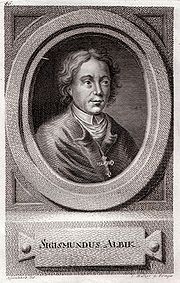| This article relies largely or entirely on a single source. Relevant discussion may be found on the talk page. Please help improve this article by introducing citations to additional sources. Find sources: "Sigismund Albicus" – news · newspapers · books · scholar · JSTOR (July 2024) |
You can help expand this article with text translated from the corresponding article in Czech. (September 2023) Click for important translation instructions.
|


"There is no other meal than meat.
There is no other drink than wine. There is no other pleasure than woman."
Sigismund Albík from Uničov
about 1358 – 1457
archbishop of Prague,
court physician of last ones of Luxemburg dynasty.
Sigismund Albicus (Czech: Zikmund Albík z Uničova) (c.1360 – July 23, 1427) was a Roman Catholic Archbishop of Prague and a Moravian.
Albicus was born at Uničov, Moravia, and entered the University of Prague when quite young, taking his degree in medicine in 1387.
Desiring to pursue the study of civil and canon law with more profit, he went to Italy and received the Doctor's degree in 1404, at Padua.
On his return to Prague, he taught medicine for twenty years in the university. He was appointed physician-in-chief to Wenceslaus IV, who recommended him as successor to the archdiocese of Prague, on the death of its incumbent in 1409.
The canons appointed him to the position, although reluctantly. Albicus held it only four years, and when he resigned, in 1413, Conrad of Vechta was elected in his place.
Albicus later received the Priory of Vyšehrad and the title of Archbishop of Caesarea. He was accused of favouring the new doctrines of Jan Hus and John Wycliffe. He retired to Hungary during the Hussite war, and died there, in 1427. He left three works on medical subjects, which were published after his death: Praxis medendi; Regimen Sanitatis; Regimen pestilentiæ (Leipzig, 1484–87).
| Preceded byZbyněk Zajíc of Hasenburg | Archbishop of Prague 1411–1412 |
Succeeded byConrad of Vechta |
References
 This article incorporates text from a publication now in the public domain: Herbermann, Charles, ed. (1913). "Sigismund Albicus". Catholic Encyclopedia. New York: Robert Appleton Company.
This article incorporates text from a publication now in the public domain: Herbermann, Charles, ed. (1913). "Sigismund Albicus". Catholic Encyclopedia. New York: Robert Appleton Company.